Raising chickens in your backyard offers the joy of farm-fresh eggs right at your doorstep. This guide is centered on the key topic of how to wash backyard eggs, a critical step to ensuring their cleanliness and safety.
Understanding the best practices for washing backyard eggs helps maintain their quality. Lets explore safe and efficient methods to keep those eggs fresh and healthy.

Understanding Egg Bloom
Eggs have a natural coating called the bloom or cuticle. This protective layer prevents bacteria from seeping through the shell. It plays a vital role in maintaining the eggs freshness. Understanding the importance of bloom will guide how you handle and wash your eggs.
The Importance of Washing Eggs
Even with the protective bloom, its sometimes necessary to clean your backyard eggs to remove dirt, debris, or potential contaminants. Knowing daily chicken egg care is essential for ensuring these eggs are both delicious and safe.
When to Wash Eggs
The timing of washing eggs is crucial. Learn when to wash your eggs in relation to their collection and intended storage. Right after collection, freshly laid eggs may have protective qualities that diminish once washed.
Supplies Needed for Egg Washing
To properly wash your backyard eggs, here are some supplies you will need:
- Lukewarm water
- A clean bowl or container
- A brush designed for eggs
- Paper towels or clean cloth
Safe Washing Techniques
Discover the best ways to wash your eggs without compromising their integrity. Use the specified supplies for optimal results. Utilize lukewarm water to prevent the egg from contracting, which can lead to bacteria entering through the shell.
The No-Soap Rule
Whilst soap might seem like a good option, its not recommended for washing eggs. Soap can strip away the bloom, exposing the egg to contaminants. Rinse well with water and a brush to tackle any lingering dirt.
Air Drying Methods
After washing, ensure eggs are completely dry to avoid bacterial growth. Explore techniques for air drying on a rack or using towels. Proper drying is just as important as washing and helps to extend shelf life.
Storing Washed Eggs
Once the eggs are washed and dried, consider optimal storage methods to maximize freshness. Storage environments can greatly affect the longevity of your eggs.
Refrigeration Rules
Learn how refrigeration affects egg quality. Whether you decide to store them in the fridge or at room temperature, ensure the conditions are right to maintain their freshness.
Maintaining Egg Freshness
After learning how to properly wash backyard eggs, focus on methods to keep them fresh longer. Discover clever tips to preserve them without a fridge as suggested in this egg preservation guide. Understanding these practices will make a big difference in the taste and texture of your eggs.
Handling Egg Variants
Not every egg is the same. Some might come with unusual layers of dirt or variety in the shell quality. Adapt your washing methods to account for these differences.
Preventing Egg Contamination
Maintaining rigorous egg hygiene protocols can prevent issues before they arise. Learn from the handling of dirty eggs techniques to ensure the highest standards of cleanliness.
Sustainability of Backyard Eggs
Beyond just knowing how to wash backyard eggs, grasp the broader benefits of raising and maintaining a healthy chicken environment. Such practices contribute positively to your lifestyle and the environment.
Analyzing the Nutritional Benefits
Backyard eggs aren’t just tasty; they are packed with nutrients. For a full understanding of their nutritional value, read more on the benefits of farm-fresh eggs.
Keeping a Clean Coop
A clean environment is a proactive step to reducing the dirt and contaminants that might be introduced to your eggs. Discover tips on maintaining the best coop design for fostering egg cleanliness and chicken health.
Daily Maintenance Habits
Laying the groundwork for daily clean-up and coop care routines helps maintain your chickens’ and eggs overall health. Implementing these practices improves egg quality significantly.

FAQ Section
1. Can I store washed eggs at room temperature?
While washed eggs can be stored at room temperature, ensure they are kept dry and are consumed relatively quickly to maintain quality.
2. Why shouldnt I use soap on eggs?
Soap removes the natural protective bloom, increasing the risk of contamination through microscopic shell pores.
3. How soon should backyard eggs be washed?
If necessary, eggs should be washed just before they are used to best preserve their natural freshness and quality.
This article contains affiliate links. We may earn a commission at no extra cost to you.










